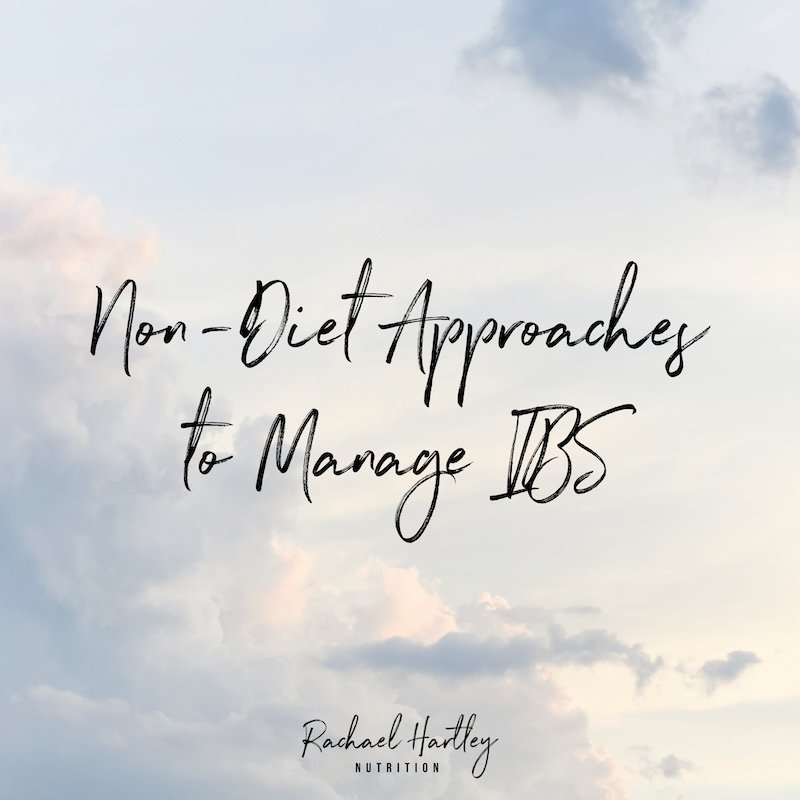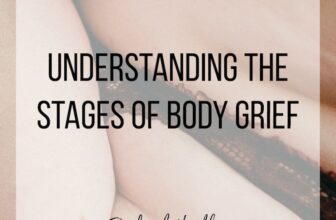
[ad_1]

In part 1 of my series on Intuitive Eating and IBS, I introduced what IBS is, some of the possible causes/factors that contribute to IBS symptoms, and how intuitive eating and a non-diet approach, especially when combined with medical nutrition therapy, can help support IBS management. I also broadly discussed commonly recommended therapeutic diets for IBS, and some of the potential pros/cons of elimination diets. Give it a read if you haven’t, but essentially the takeaway was that IBS is a very individual diagnosis, and there’s no single “right” way to treat it. What helps one person may not work for another, and may even cause harm.
In part 2, I am sharing specific non-diet tips and strategies for managing IBS. As I mentioned in Part 1, there may be some cases where reducing or eliminating a food is indicated, but that’s a lot less common than Dr. Google makes it seem! For most people, I recommend using non-diet strategies before trying an elimination diet or giving up a food you love. I’ll note, a few of these non-diet strategies pertain to food, but they’re more about increasing intake and eating patterns, so I still consider them to be non-diet.
Non-Diet Strategies for Managing IBS Symptoms
Deep breathing before eating.
Because there is a strong connection between the brain and the gut, there is a strong relationship between anxiety and IBS. The vagus nerve runs from the brain down through the gut and is involved in regulating everything from breathing to heart rate to digestion (i.e. the autonomic nervous system). Most people are familiar with the “fight or flight” stress response (also called the sympathetic nervous system), which is part of the autonomic nervous system. In this state, digestion slows and blood flows away from the gut towards the extremities. As you might guess -or perhaps have experienced personally! – when you are in a constant state of sympathetic activation, IBS symptoms ramp up.
Another part of the autonomic nervous system, which is regulated by the vagus nerve, is the parasympathetic nervous system. Another name for our parasympathetic nervous system is “rest and digest.” In this state, blood is directed to go the gut to assist in digestion and absorption of nutrients, and helping the muscles in the gut move things along.
To help activate your parasympathetic nervous system, it can be helpful to give yourself a moment for deep breathing before eating. Any breathing technique that helps you feel calm is great, but I like to recommend diaphragmatic breathing, which stimulates the vagus nerve. Here’s a helpful description and demonstration of diaphragmatic breathing. Even just taking 10 seconds to slowly breathe can be helpful! Another meditation/breathing exercise I recommend is progressive muscle relaxation, which I find is especially beneficial for people who hold tension in their gut.
Aim to eat every 3-4ish hours throughout the day.
One of the biggest IBS triggers I see among my clients is a chaotic eating schedule. Eating on an irregular schedule, going long periods of time without eating then eating larger amounts, can cause a lot more discomfort than any individual food. In fact, I often find when clients eat on a regular schedule, they can tolerate foods that used to trigger symptoms. While there’s no need to follow a strict eating schedule, having a consistent flow with eating is helpful, as it gives your gut a chance to get into a predictable rhythm. I’ll note, the 3-4ish hour recommendation is a general one to help prevent going too long without eating, but some people may benefit from eating more frequently, and occasionally there may be someone who does better going longer periods.
Aim for balance at meals.
By balance, I mean aiming to include a source of protein, fat, and carbohydrate at meals, ideally along with some produce. Similar to as I described above, by aiming for balance at meals, it allows your body to expect consistency in how you’ll be feeding it. Also, each of the macronutrients stimulates the release of different digestive enzymes, which is helpful for digestion. Dietary patterns that are inadequate or excessive in one or more of the macronutrients can lead to digestive symptoms. Aiming to include different foods at meals helps ensure you’re not getting too much or too little of any one thing.
Try gut-directed hypnotherapy.
Gut-directed hypnotherapy is a kind of hypnotherapy, but for the gut. The hypnosis is nothing like the sort of sensationalized depictions you often see in media, but rather a therapist helping a client achieve a state of deep relaxation, then using guided imagery and meditations, as well as education about how the gut works. Sounds kinda “woo,” but there is research showing that it can reduce symptoms by up to 80%, and is similarly effective to a low FODMAPS diet. Here’s a helpful article on the treatment if you’d like to learn more, and here’s a list of providers who are trained in gut directed hypnotherapy. If you can’t find a provider, I’ve had clients who have found good success with Nerva, a gut-directed hypnotherapy app.
Consider supplements.
There are a TON of supplements out there that get thrown at people at IBS. I’m pretty cautious about recommending supplements, as often they aren’t backed up by rigorous research, and can do more harm than good. Regulation of dietary supplements in the US is also a bit of a crapshoot. Just because something is natural doesn’t mean it’s harmless. Most medications originally come from a natural source, and if something has a medicinal effect in your body, that means there’s potential side effects too. I suppose the good news is that most supplements actually don’t do what they say, and the most likely effect is what we like to call “expensive pee!”
That said, there are some supplements that may be beneficial for some people. Please note, these are not individual recommendations, and if you do choose to try a supplement, please do so under the guidance of your doctor or a dietitian with experience in IBS.
[ad_2]






